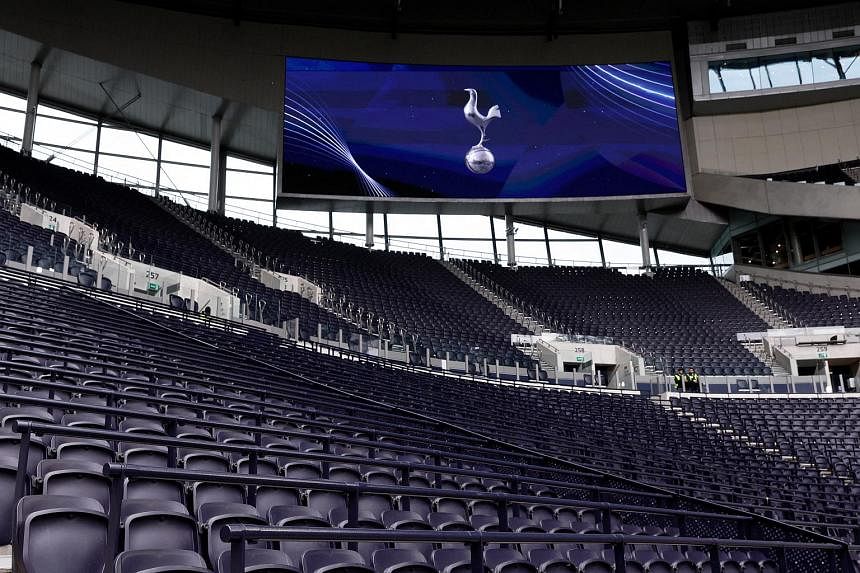LONDON (Bloomberg) - The cost of watching Premier League football is rising for most fans, stretching the budgets of tens of thousands of supporters already dealing with the United Kingdom's cost-of-living crisis.
Of the 20 teams competing in England's elite competition next season, 11 have increased the price of their costliest 19-match pass, with nine charging more for their cheapest option, according to data compiled by Bloomberg. Supporters and clubs are contending with inflation at its highest level in 40 years and an unprecedented squeeze on living standards.
The increases are more widespread than a year ago, when only six teams raised season-ticket costs amid Covid-19 uncertainty. Only eight clubs are choosing to freeze their top prices for the coming year, including Liverpool, which lost in Saturday's (May 28) Champions League final.
Tottenham Hotspur, which qualified for next season's Champions League by finishing fourth in this year's Premier League, sells the most expensive season ticket in England, with the priciest pass at its 62,850-seat stadium costing £2,025 (S$3,500).
Though prices are frozen for 2022/23, it would cost a resident in the local borough of Haringey 90 per cent of their monthly median salary, according to Bloomberg calculations.
Even the club's cheapest option (£807) would run to almost a third of a local supporters' monthly wages. At current levels, ticket prices show "a worrying disregard for the economic realities facing many fans," said Katrina Law, co-chair of the Tottenham Hotspur Supporters' Trust, which is lobbying the club to make tickets more affordable.
"Access to tickets is the gateway for all fans, so it's essential the entry point is affordable," Law said.
In a statement, Tottenham said the club's stadium "offers supporters an unrivalled experience in a world-class facility," and noted that it offers the option to spread the cost of season-ticket payments over 10 months.
Tottenham's North London rival Arsenal tops the league table for most expensive "cheap" season tickets. At £927, its pass costs 14 per cent more than a year ago. The club told Bloomberg that discounts available for Europa League games and other cup matches increase the value of its season tickets.
Fans of Wolverhampton Wanderers, which finished 10th in the season just finished, are angry that the club appears to routinely raise prices each year, apart from during the Covid-19 closures. The costliest and cheapest passes to watch Wolves, as the team is known, are rising to £786 and £590, respectively.
"The latest increase now takes us above Aston Villa as the most expensive season ticket in the West Midlands," said Neil Dady, board member at the Wolves 1877 Trust, the club's most prominent supporters' group. "It is a shameful approach" in the current economic climate, Dady said.
The cheapest ticket at Villa, recently named one of Europe's most valuable teams, is up by 38 per cent to £531, while the most expensive option rises 10 per cent to £752.
Mo Razzaq, club liaison officer at the Aston Villa Supporters' Trust, said the price rise is "disappointing, even more so as we enter into a cost-of-living crisis."
A spokesperson for Aston Villa, promoted to the Premier League in 2019 after three years in the second tier of English football, said the club's tickets "remain competitively priced" and noted that costs had not increased since 2016.
One team that has yet to announce its season-ticket plans is Chelsea, which is under new American ownership after Roman Abramovich was forced to sell. The club last year announced plans to sharply increase the prices of hundreds of seats and upgrade them to hospitality, prompting fan outrage. Most season-ticket prices do not include hospitality, but many clubs are attempting to upgrade a percentage of their seats as they seek higher revenue.
Broadcast Deals Keep Premier League Afloat Covid-19 lockdowns knocked a hole in Premier League finances, with fans only returning for good in August last year. Premier League Chief Executive Officer Richard Masters said clubs lost around £2 billion because of the pandemic.
Matchday income only accounted for around 13 per cent of Premier League clubs' revenue in the 2018/19 season, according to a Deloitte LLP report on football finance in the final full pre-pandemic campaign. Broadcast income of more than £3 billion accounted for 59 per cent of their earnings, the biggest chunk of the league's income.
The Premier League eased the financial impact of Covid-19 by rolling over its lucrative domestic broadcast contracts with Sky Ltd and BT Sport for another three years, while increasing the value of its overseas haul.
The impact of the highest broadcast revenue in Europe has enabled Liverpool, Tottenham and fallen giant Manchester United to freeze their prices. Those three clubs, as well as Arsenal, Chelsea and Abu Dhabi-owned Premier League champions Manchester City, the so-called "Big Six", angered fans in 2021 by announcing - then promptly abandoning - plans to join a breakaway European Super League.
Months later, Liverpool has frozen season-ticket prices for a seventh consecutive campaign, much to the delight of supporters. "They knew our position on the economic climate and they told us there was going to be no increase, but we didn't have to negotiate hard," said Joe Blott, chair of the Spirit of Shankly supporters' group.

